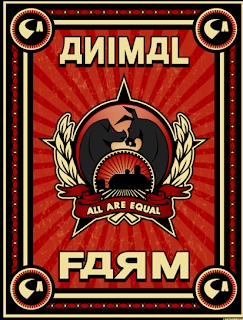
Compare the ways Orwell portrays Snowball and Napoleon: A – A* grade Model Essay
Snowball and Napoleon are the two leaders who compete for power in the early to mid-section of Animal Farm. The two pigs emerge as the leaders of this apparently egalitarian society immediately after the death of Old Major. Although the principle is communistic (all are equal), Orwell makes the problem of power immediately obvious. Old Major’s death leaves a power vacuum someone must fill.
The pigs represent the leaders of Communism: Trotsky, Stalin and Marx/Lenin respectively and in this fable of the struggle between Napoleon and Snowball allows Orwell to dramatise the contradictions at the heart of Communism – that all are equal, but ‘some are more equal than others’.
The pigs represent the leaders of Communism: Trotsky, Stalin and Marx/Lenin respectively and in this fable of the struggle between Napoleon and Snowball allows Orwell to dramatise the contradictions at the heart of Communism – that all are equal, but ‘some are more equal than others’.
Snowball and Napoleon are both instrumental (essential) in the Rebellion, at the start of Chapter Two, and as ‘pigs’. At first, they are ‘teaching’, but also ‘organizing’, which leads naturally to leadership. They are acknowledged by the others as ‘the cleverest’ of the animals, so already we can see there is a natural order emerging. Napoleon is portrayed as a quiet ‘fierce’ animal ‘with a reputation for getting his own way’. Orwell presents Snowball in a more attractive light: as ‘vivacious’ ‘quicker’ and ‘inventive’, and says he is ‘best at writing’ which are all borne out later as he masterminds the building of the ‘Windmill’ and formulates the ‘Seven Commandments’. The Windmill represents the mechanization of Russia which pulled it out of the dark ages, improving the lives of the many. Usually, Snowball is at the front – at first – he speaks before Napoleon and is first to come up with a new idea, though this dramatically reverses in Chapter Five.
Snowball paints the commandments himself, with Squealer ‘below’, which is more hands-on than Napoleon and seems as if it comes from his heart. Napoleon’s genius is in organizing a bureacracy with a specific group to do tasks that are more to do with the leader then the people: ‘dogs’ (the KGB) to protect him, Squealer and ‘the sheep’ to run marketing campaigns, and the rest to do the hard work. His plan to take the puppies shows real foresight, putting them in ‘seclusion’ until they are ‘nine enormous dogs’, and uses them to end the debate on who to ‘Vote for’ with the threat of violence. Napoleon’s real genius is in getting power and keeping it, for his own benefit.
Orwell portrays Snowball as more in tune with egalitarian principles. He sets up a range of ‘committees’ so all the animals’ voices can be heard. Equally, in the various battles, Snowball is at the front of the charges, whereas Napoleon ‘directs operations from the rear’. Snowball simplifies the Commandments so all can understand them. Later, Napoleon uses Squealer to do his dirty work, a stark contrast. This suggests Snowball is more altruistic [wants to help other people for no personal gain] – as Orwell says he took care ‘for the benefit of the others’. Snowball also uses ‘comrades’ frequently, suggesting brotherhood. He seems not so much interested in power as the power to improve the animals’ lives. However, he does seem a little out of touch, as Orwell writes ‘the birds did not understand Snowball’s long words.’
Ultimately, Napoleon is more successful as a leader in purely selfish power-based terms. He manages to re-write the Battle of the Cowshed, so that Snowball’s bravery is transformed into cowardice. Napoleon controls reality: a dangerous and sinister power in the hands (trotters) of a mean-minded pig who is greedy for ‘milk’, ‘apples’ and finally ‘whisky’, taking the leadership in a complete circle from Jones’, ‘too drunk’ to look after the animals properly, to a pig, in ‘leather’ pants with a ‘whip in his trotter’ welcoming humans to the farm and complaining about his ‘lower animals’. Napoleon, through Squealer corrupts the ideals totally, transforming Snowball’s noble words: ‘All animals are equal’ into ‘But some are more equal than others’.
In conclusion, Orwell portrays Napoleon as the personification of the proverb: ‘power corrupts; absolute power corrupts absolutely’, although, it’s arguable that Napoleon was corrupt from the start . He was ‘fierce’ from the beginning and ‘had a reputation for getting his own way’, but previously was held in check by Old Major, Jones and for a time, by the balancing force of Snowball. Napoleon is meant to represent Stalin, but is actually much milder – in the same way that Snowball seems to be idealised as the perfect alternative. Orwell didn’t know Stalin allegedly killed twenty million (or more), or his portrayal may have been much worse. Selling Boxer’s old body for ‘whisky’ is disgusting, but not disgusting enough to capture the reality.
